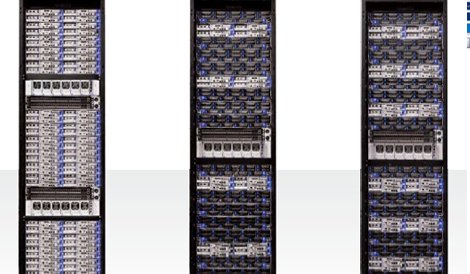About four years ago Jonathan Heiliger, then VP of infrastructure and technical operations at Facebook, came to representatives of the Taiwanese hardware manufacturer Quanta asking whether they could design and build a custom server for the social network.
Mike Yang, who runs Quanta’s cloud computing business unit, recalls telling Heiliger and his team the manufacturer was tied up in a deal with a certain “D-company”. (He says it that way to avoid mentioning Dell’s name directly because they are a customer – making the servers the D-company was selling to Facebook.)
But Heiliger wanted something different. Something more customized than his hardware suppliers were able to provide. That was when Quanta’s management realized the company’s potential in the hyperscale data center market, Yang says.
It had the engineering chops and the manufacturing capabilities. All that was needed was knowledge of these customers’ requirements and it could deliver exactly what a company like Facebook needed without charging it the mark-up an HP or a Dell would.
This is how Quanta got into what Yang calls “engineering consulting services” – designing and building hardware for massive data centers based on the operators’ specs. Other Taiwanese original design manufacturers (ODMs) such as Wiwynn also got in the game, and now in addition to the big US server vendors hyperscale customers have a wider pool of suppliers to choose from.
Old and new
Today Quanta is both old and new. “We’re old because we used to be an ODM,” Yang says. What it did in the past was take design specs from the original equipment manufacturers (OEMs) and do the design and manufacturing work for them.
“But we’re new because we changed ourselves.” Over the past three or so years the portion of Yang’s unit’s business from hyperscale customers has grown from about 35% to 85% (recorded last year) he says, adding he expects the number to cross the 90% mark in 2014.
The latest big hyperscale opportunity that has come up for Quanta is to supply servers built to the latest spec Microsoft has designed to support its cloud services. The Redmond, Washington, company has chosen the Taiwanese firm as one of three first vendors to receive the spec, together with HP and Dell. Quanta will compete with the big US OEMs for the business, as it has over the past few years, trying to deliver the best performance and energy efficiency for the cost.
‘One neck to choke’
Ultimately, in Yang’s mind, the company’s big value proposition will be providing integrated end-to-end hardware infrastructure: servers, storage and networking switches.
He says customers will find it valuable to work with a single vendor instead of three – a Dell for servers, a Cisco for switches and routers and an EMC for storage. “If we provide everything to them there’s only one neck to choke,” Yang says.
All the OEMs, of course, have been pushing pre-integrated full-stack IT solutions for some time now, often referring to the approach as ‘converged infrastructure’. Those solutions, however, are not built out of stripped-down, commodity components that have given ODM’s like Quanta such sway with hyperscale operators. Further and further commoditization of the hardware will continue to be a major strategic priority.
Yang believes Quanta has a technological advantage as far as integration goes. It is not an easy job, and the company has been cultivating this capability over many years, he says.
Open Compute: access to clients
Quanta is deeply involved in the Open Compute Project, the Facebook-led open source hardware design community which has become a channel for end users like Facebook, Microsoft, Yandex, Baidu, Goldman Sachs, Fidelity, Box and Rackspace, among others, to get proposals from ODMs as well as traditional IT vendors. Open Compute levels the playing field for these vendors and incumbent hardware suppliers in competing for hyperscale business.
No interest in legacy
While Open Compute evangelists have been saying that traditional enterprise customers will eventually find a way to use the community’s value, that vision still seems far from realizing. Quanta has taken a wait-and-see stance on entering the enterprise market.
Its strength is in hardware and competing with the likes of HP and Dell, which have been providing enterprise solutions that combine hardware and software for many years, will be an uphill battle. “That might be our next step, but we’re still thinking,” Yang says. “For our current business we’re very much focused on hardware only.”
The company may gradually enter the enterprise market but Yang does not want to provide legacy solutions. “That is something that I’m totally not interested in.” He wants to provide hardware to forward-thinking enterprises that are building cloud infrastructure. “If those enterprise customers move to the private cloud and hybrid cloud, then I think I will be very much interested.”
For now, however, it is full-speed ahead toward commoditized, pre-integrated hardware for hyperscale data centers – a comfort zone his business unit is pretty happy with.

